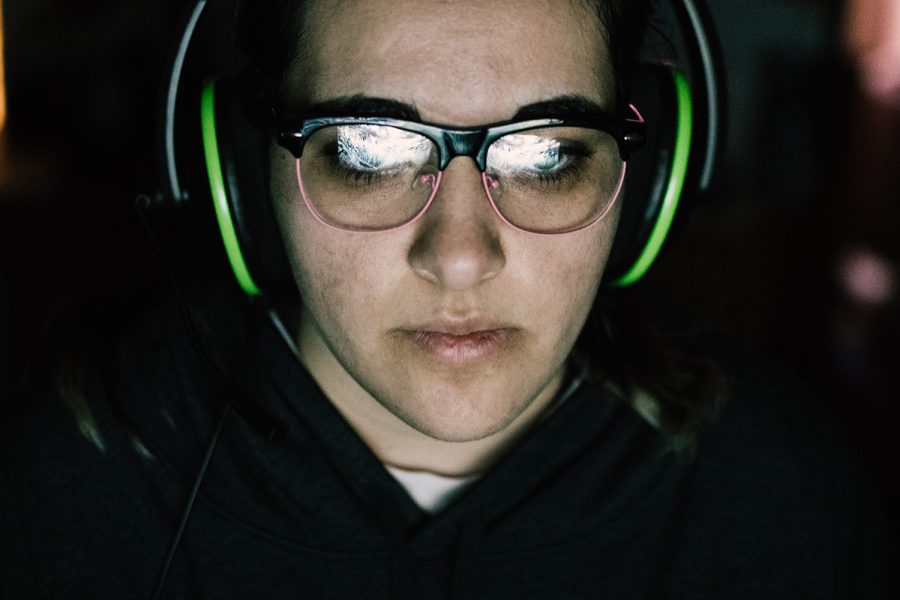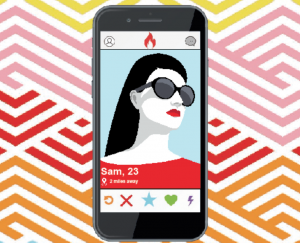EGaming: the competition behind the computer
Online gaming and eSports have grown tremendously in recent years, with increasing numbers of college students participating in tournaments and streaming on Twitch.
Junior Teresa Mora plays Black Ops 2 in her room at Currier Hall in Iowa City on Monday, February 18, 2019.
February 20, 2019
While most sports require physical prowess, athletics equipment, and rigorous strength training, one sport can be played from the comfort of a college dorm room without ever having to step foot outdoors.
The popularity of gaming and eSports — competitive gaming — has increased exponentially over the past few years as faster and flashier technology has evolved and players become more immersed in deep and extravagant storylines.
Although online gaming may not be well known to those outside the eSports “scene,” the gaming spirit is thriving on the University of Iowa campus.
University of Iowa sophomore Dylan Montigney, the head of the Overwatch division and community manager of ESports at Iowa, said the club practices two nights a week and has Sunday matches from 4:30 to 9 p.m.
“Back in high school, there was a really big scene for if you were good at basketball, you would go to state,” Montigney said. “What a lot of people don’t realize is eSports requires the same amount of skill, just a different type. Instead of using your muscles, you’re using your brain power. It’s all about team coordination. Instead of working out, you’re improving muscle memory, your reaction time, tactics. It’s about outsmarting, outplaying the enemy opponent.”
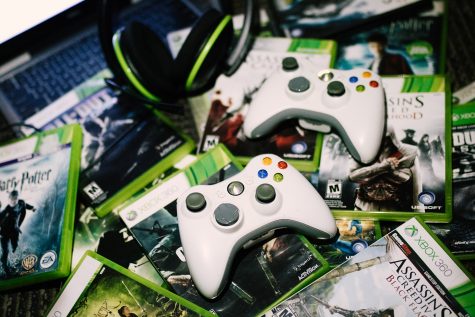
Junior Teresa Mora’s collection of Xbox games in her room at Currier Hall in Iowa City on Monday, February 18, 2019.
ESports at Iowa has divisions for “Overwatch”, “Call of Duty”, “Super Smash Bros.”, and other popular games. They participate in online and in-person tournaments against other schools in the Midwest, including Iowa State and UNI. The A team for the “Overwatch” division, Oddly Omnic Gold, recently qualified for regional playoff, and it hopes to qualify for nationals. Montigney said the team is ranked in the top 2 percent of North America.
“When you get to the really high levels, you realize just how ridiculously in tune people are with the game and how hard it is to compete if you’re not prepared,” he said. “People don’t give [eSports] the full respect that it deserves. I think as time goes on and you get more advocates, and people realize just how difficult it can be to perform at that highest level, it’s going to become a lot more popular.”
ESports is becoming more legitimate, with ESPN featuring eSports and Mark Cuban investing in the eSports industry. Just like a traditional sport team, an eSports team represents its university and competes to earn its school rankings among national competition.
“I am currently on the University of Iowa ‘League of Legends’ B team,” UI senior Adam Roper said. “We do scrimmages against other universities about once or twice a week. We also play a tournament match every Saturday, and sometimes we travel — for example, last semester we went to Davenport. Currently, we’re ranked No. 48 in the nation.”
The UI eSports team works competitively yet still provides the same positive connections that other university organization do.
“I got into gaming by just meeting the right people at the Activities Fair,” Roper said. “To meet people, you definitely need to be in clubs. As far as eSports goes, though, if you walk into tournaments, you automatically meet 30 new people, because you all have a similar interest.”
Regardless of the competitive nature associated with gaming and eSports, for many it is a good way to relax on campus with friends.
“There are people who have been playing for a long time and are really good, and then there are people who are just starting out,” UI sophomore Elias Kim said. “[Gaming here] really is just a positive environment. Everybody is just trying to see other people get better, which is really cool. There are negative stereotypes around gaming, but really everyone wants to see other people improve.”
Kim participates in weekly “Super Smash Bros Ultimate” tournaments. The environment is very welcoming, no matter a player’s skill level.
“If anyone wanted to join they could,” Kim said. “Right now, the demographic is mostly guys. At the bigger tournaments, they have a fair number of girls. I don’t see anybody there making anybody uncomfortable. The atmosphere is just a ton of people hanging out. Some people come to compete, some come to hang out, some are here for both. You just need some friends and a console.”
The tournaments are streamed live by UI students every Friday starting at 7 p.m. at twitch.tv/magma514.
“The first time I played on-stream, I was nervous,” Kim said. “But it’s nice because if you have any friends interested, you can say, ‘Hey, I’m about to play soon.’ Or for yourself, you can refind those videos and see what you did right or what you did wrong. A lot of the times, we have someone on mic saying what’s going on to the viewers.”
Rather than in-person tournaments, UI sophomore Bryce Benedict appreciates the competitive aspect of online sports and action games such as Madden and Call of Duty. He also watches other gamers play on YouTube and Twitch.
“It’s kind of like watching sports. You watch people do stuff that you can’t do because of the talent that they have,” Benedict said. “It’s kind of cool watching. It’s like that in video games. Some people say you can get stressed from video games because it works your nerves up, but it’s a good way to get your mind off school.”
Online streaming that offers real-time viewing of the world’s best players has popularized the tendency of competitive players to seek better scores and faster times. A person can have an entire career as a professional gamer and can compete in national competitions to win thousands of dollars in cash prizes.
According to statista.com, the eSports market revenue for 2016 was $492.7 million and is expected to be almost $1.5 billion by 2020. This chalks up to be an estimated compound annual growth rate of 32 percent in a span of just four years. While this includes prize money from tournaments, the majority of revenue comes from sponsoring and advertising.
That is just in regard to the smaller eSports category, which includes competitive gamers. The market for casual and professional gaming combined is astounding, nearly $125.3 billion in 2018, according to newzoo.com.
“On the economic side, there is a lot of money in gaming,” UI junior Mathew Hintz said. “If you get signed to a professional team, you can have a far greater than average income.”
To be an individual professional gamer involves a lot of hours.
“I have a little brother who is a professional video gamer,” Roper said. “He dropped out of high school and trains 11 or 12 hours a day to prepare, Monday through Saturday. He travels to California for about three weeks at a time to compete.”
Those with Twitch channels stream their game play live and can even make money from people watching.
“It’s really cool that people are getting jobs gaming for a living. It’s really a huge thing. People just watch them play video games, and they get money for it,” Benedict said. “People can donate to them. Not only are they competing in these video games, but people are giving them money just to watch them play. I watch them, but I don’t give money.”
Viewers have donated hundreds of dollars at a time to their favorite Twitch channels. The biggest, most popular streamers can partner with Twitch, receive the ad revenue, and even get sponsored in tournaments.
The most popular of these Twitch channels is Tyler “Ninja” Blevins’ channel, with 418 million channel views. A January article by Dot Esports estimated that Blevins makes almost $350,000 per month from his more than 13 million followers. This does not include the ad revenue he makes from Twitch.
It is difficult to make a living at professional online gaming or as an eSport competitor unless you are the absolute best of the best.
“The life of a gamer is rough,” Hintz said. “There is a casual side to online gaming, which isn’t profitable, but still played a lot. To be professional, though, you have to play consistently well. The age of a professional gamer is in the 20s and 30s. It’s a similar range as chess. After you reach a certain age, your brain starts to think less quickly, your hands cannot place inputs as quickly.”
Because of this, many college students only play games casually, spending free time on gaming rather than treating it as a full-time job. One reason video games have surged into popularity among students specifically is using games as a coping mechanism for stress, as well as a way to keep in contact with each other, regardless of where they live.
Some even use gaming as a way to keep track of family members, especially younger ones.
“I play online mostly with my family,” UI junior Teresa Mora said. “My two nephews play, so I usually play with them. It’s a good way to keep in touch. Once my friend group figured out that I was into gaming, not just in it for the trend, it became easy to play with my guy friends.”
For some, it’s the only way to keep in touch with siblings who may be less willing to chat on the phone. For UI sophomore Hunter Koontz, online gaming is a way to spend time with his brother, who goes to high school in California.
“It’s definitely a good way to keep in touch with my brother,” Koontz said. “It’s one of the only ways we communicate with each other, we don’t really hang out as brothers unless we’re playing online games. It’s a great way to hang out with people that I don’t really get to see physically on a regular basis.”
Through the common interest of gaming, people of all ages have been able to build a community.
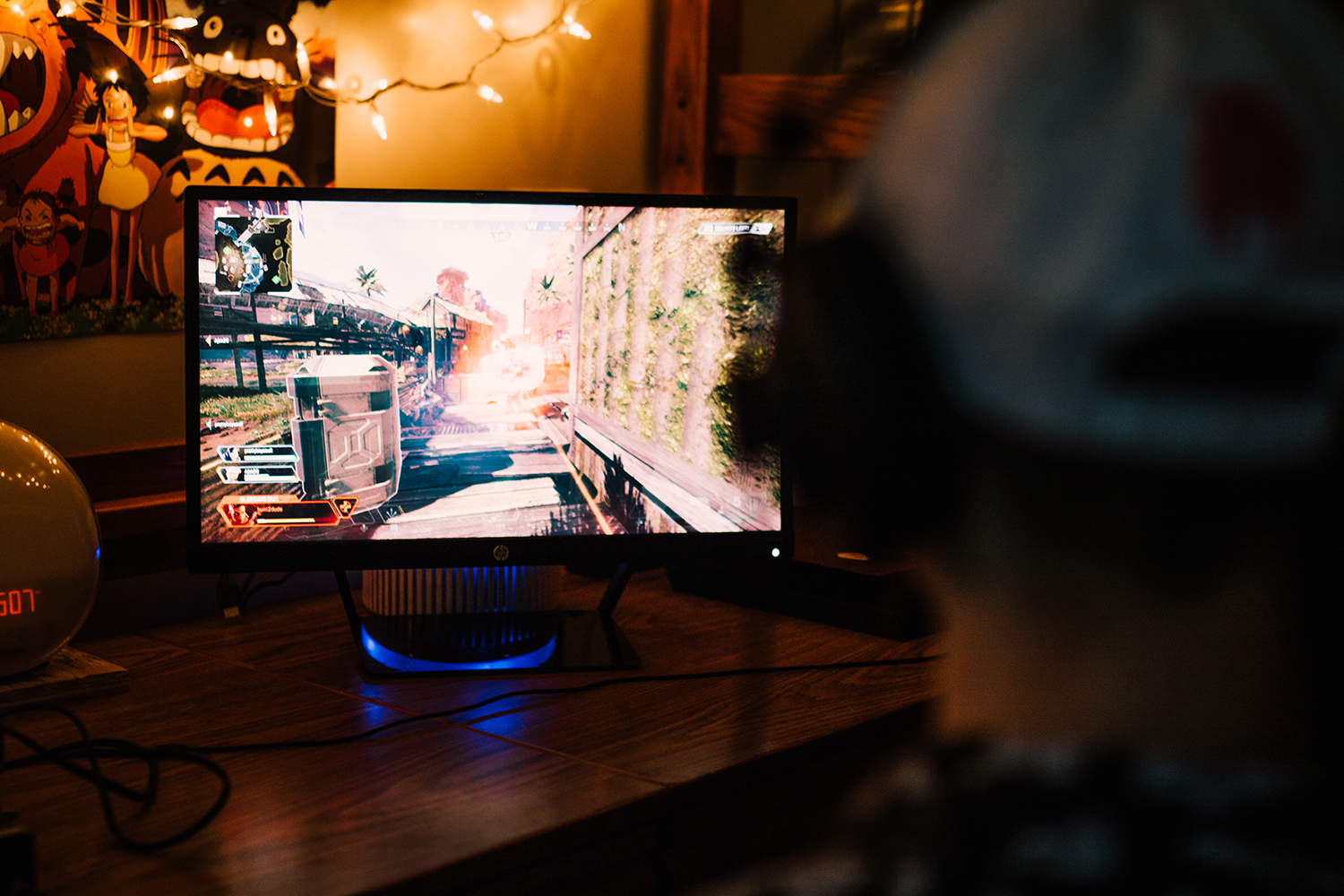
Sophomore Hunter Koontz plays Apex Legends in his room at Catlett Hall in Iowa City on Monday, February 18, 2019.
“I think [gaming is] a way to connect the community and give you something to do to take your mind off of school,” UI freshman Ethan Bricker said. “I play with some high-school buddies, and it’s a good way for us to keep in touch.”
Through popular streaming platforms such as Twitch, Youtube, and Discord, tightly knit gaming communities have emerged. In the same way that friends joined chat rooms on Club Penguin in the early 2000s, people can chat with entire communities on a large scale, all in real-time.
“For the most part, I tend to use text chat for gaming, such as Discord,” UI junior Caleb Mann said. “Discord is basically a voice channel with a text-based-system. Each channel is a zone, and you can separate into groups and talk.”
While many gamers interact online, some choose to play together in person and outdoors, an option possible thanks to increasingly powerful GPS and virtual-reality technology.
Such is the case with “Pokemon Go”. Launched on smartphones in July 2016, the game gained immense popularity very quickly. Just as quickly, supposedly, it fell into disuse by a majority of the population. However, a core of fans has continued to play in Iowa City.
The Pokemon trainers often use Facebook and Discord to communicate. The game involves walking around in the real world to locate Pokemon to try to “catch” and battling others with caught Pokemon to win over gyms. Players can also join three different teams: Valor, Mystic, or Instinct.
Player Rey Pirko, also known as KaosGreen to the “Pokemon Go” community, is the server admin for the Iowa City Pokemon Go Discord. She said it was a slow start at first to bring everyone together.
There are more than 1,600 members of Iowa City’s “Pokemon Go” Discord. Pirko estimates an active 200 to 300 players, both casual and dedicated, at any given time. She said there is a lot of diversity in the types of people who play “Pokemon Go”, having even run into a professor of archeology who played.
“In Iowa City, it’s amazing. They’re very accommodating of people with disabilities. We have a lot of interesting people on our server, just wide ranges,” she said. “I’ve got doctors, I got daycare specialists, I got swim-team people. It’s an amazing culture to get out there and know people. If it were a LinkedIn, you could probably meet anyone you needed to meet to further your career. I got car salesmen, I got everybody, librarians, astronauts, probably.”
Pirko said players aren’t always talking about Pokemon.
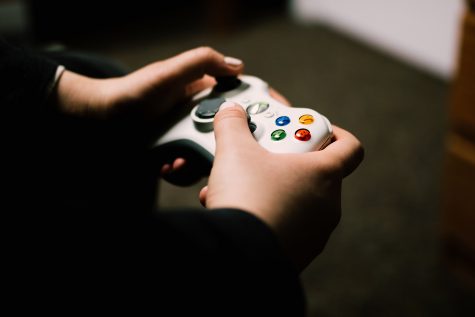
Junior Teresa Mora plays Black Ops 2 in her room at Currier Hall in Iowa City on Monday, February 18, 2019.
“You can communicate and have a good time with other people that are like-minded. That’s what I’ve liked about it,” she said. “You meet so many people it’s hard to lose interest. It doesn’t affect the communication level that we’re having. People are staring at their phones all the time, but we’re also talking and getting to know each other.”
There are many dedicated players that help Pirko run the discord and set up events — one of whom is Amanda Sapir, street name PokeyTheGwumph. She said being forced to go outside and interact with other people in order to play “Pokemon Go” has improved her mental health.
“I’ve had my fair share of struggles with mental illness. I have my meds and that helps tremendously, but [“Pokemon Go”] has turned out to be just really therapeutic,” she said. “This is the most socialization I get in months. There’s something really satisfying about this. It hits that collecting desire without actually having a ton of things filling up your house.”
She said she has met many others struggling with mental illness who play the game as well.
“A lot of people in our community, I found out, do this to improve their mental health,” she said. “It’s pretty fascinating talking to a ton of people where this is to save them, almost. For me, it’s therapy. For a lot of other people it is as well.”
Some argue that escaping into a RPG world is tempting for players who suffer mental-health issues or strained home lives. Gaming can become addictive if used for the wrong reasons.
“Gaming addiction is real,” Mora said. “It allows a lot of kids, especially those with tough lives, to escape to the virtual world. That escape can be addicting. It’s similar to how someone would escape through alcohol.”
Part of the temptation for people who may have addictive personalities, is that games are designed to reward players frequently enough so that they want to keep playing.
“In general, it’s not the worst addiction to have,” Koontz said. “You can get a lot of positive things out of gaming, but it’s also an addiction that brings a sense of accomplishment which is different than the more passive forms of addiction, such as television or substance use.”
That said, however, there is an unfair stigma centered on gamers, because, as with any other hobby, online gaming and eSports only become unhealthy when abused.
“I think [gaming addiction] exists and can definitely be a problem for people,” Kim said. “However, I think the way most media portray it is problematic, especially in regard to competition. The best people at competing aren’t the people who let games encompass their lives, but the ones who keep a healthy lifestyle along with their hobby and job. The way I’ve seen it represented makes game addiction and competition seem closely connected, but I don’t think that’s the case.”
Whether they play competitively or casually, online games are set apart from other organizations by the dedicated community that comes with connecting players around the world. Both mentally and socially, many can benefit from playing online gaming and eSports together.



